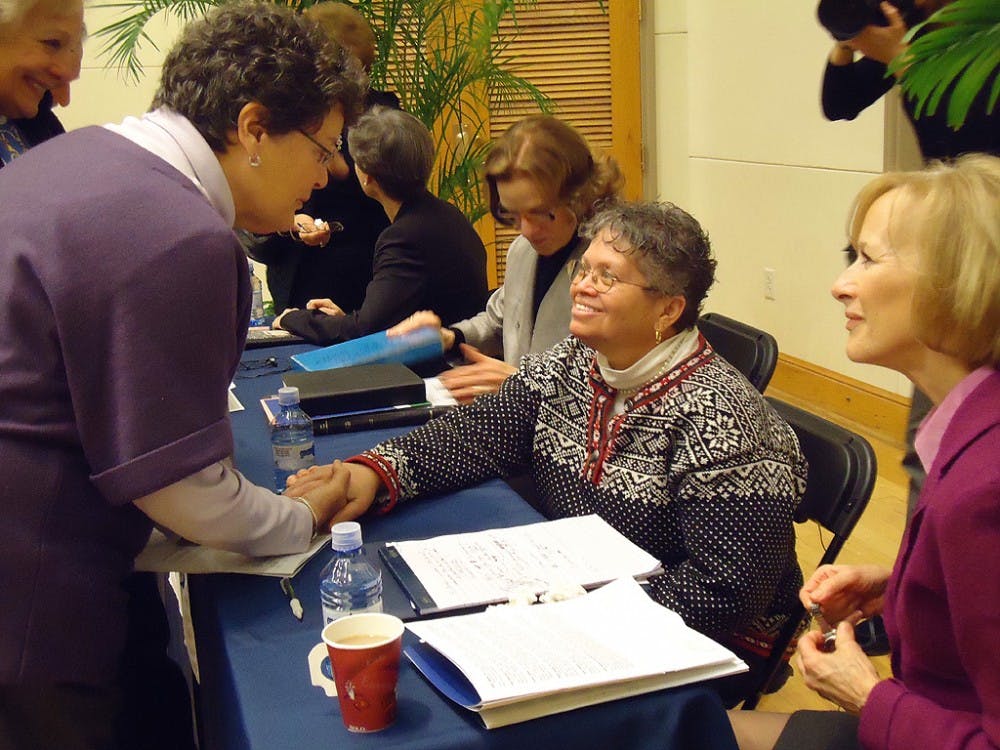Upcoming changes to Duke’s social and residential cultures echo the experiences of some notable Duke alumnae from the late 1960s and 1970s.
“The Sixties and Beyond: Lasting Impacts of Social Change” was a panel discussion led by noted journalist Judy Woodruff, Woman’s College ’68, and featured a discussion between Dr. Brenda Armstrong, Woman’s College ’70 and associate dean and director of admissions for the School of Medicine; Allison Haltom, Woman’s College ’72 and former vice president and university secretary; and Dean of Students Sue Wasiolek, Trinity ’76. Panel members spoke about their experiences at Duke during the era of the Woman’s College, and then discussion opened to audience members.
“[This panel] celebrates the fact that the concept of the Woman’s College really worked at the time... but women have really moved into a much different position across the board, from administration to students to political issues,” Armstrong said in an interview before the event. “This is a different era—to have 40 years to celebrate women at Duke is... an incredible opportunity.”
Much of the conversation focused on the importance of the Woman’s College housing model to the women’s experiences. As members of the Woman’s College, women lived in the same residence hall for all four years of their undergraduate experience, which the alumnae said fostered a strong sense of community and a reliable safe haven.
“One of the things that happened... were these wonderful hallway conversations,” Haltom recalled. “I can remember sitting on the floors in Alspaugh talking, and we might be talking about dates for a while, but we would go on and talk about world issues, and there was a lot [of] mentoring and caring about one another.... When we dissolved [the] Woman’s College... there were some things—especially residential—that were really lost for women.”
Panel members said they relied on the sense of community of their residence halls to tackle other issues, including socioeconomic status and race. Armstrong recounted her experience as one of a small minority of black women during a particularly turbulent time for blacks.
“When Martin Luther King [Jr.] was assassinated, I can remember to this day exactly what I was doing,” she said, tears coming to her eyes. “I was sitting on my floor in the dormitory and one of the other African-American women—Alexis Smith—came and she said, ‘Martin Luther King has been killed,’ and we felt this incredible urge to go to everybody, to knock on their door and say, ‘we need your help.’ We didn’t say ‘we’re mad,’ we said, ‘we need your help.’ There was this spontaneous house meeting for everybody to allow us to cry.”
Wasiolek, like her peers, said she relied on the comfort her living experience provided her as she faced personal issues.
“I struggled academically, I struggled socially and the only thing that saved me was the residential living experience,” Wasiolek said. “I don’t know what I would have done without that place to go home to at the end of some very, very difficult days, just for me personally.”
Later in the discussion, Wasiolek said she believes the house model—to take effect this Fall—is meant to bring back this sense of stability and community to residence halls, though it may take a few years to achieve this goal.
After the panelists concluded, audience members stood up to discuss a variety of topics regarding their Duke experiences, from the 1940s through the 1980s.
Barbara Janulis, Trinity ’83, said she was grateful for the opportunity to listen to the panelists talk about their experiences with such difficult issues.
“It was inspirational to hear so many different experiences,” Janulis said. “It was very moving, just powerful.”
Get The Chronicle straight to your inbox
Signup for our weekly newsletter. Cancel at any time.

